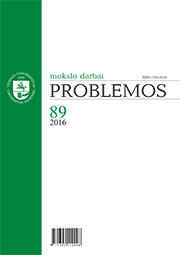SUBJEKTO SAMPRATA SCHELLINGO TRANSCENDENTALINIAME IDEALIZME IR RACIONALAUS IDEALIZMO KRITIKOJE: LYGINAMOJI ANALIZĖ
THE CONCEPTION OF THE SUBJECT IN SCHELLING’S TRANSCENDENTAL IDEALISM AND IN HIS CRITICISM OF RATIONAL IDEALISM: A COMPARATIVE ANALYSIS
Author(s): Paulius KukisSubject(s): Early Modern Philosophy, 19th Century Philosophy, German Idealism
Published by: Vilniaus Universiteto Leidykla
Keywords: Schelling; subject; object; German Idealism; intelligibility; transcendentality; speculativity;
Summary/Abstract: The aim of this article is to define certain distinctive features of the conception of the subject in Schelling’s rational transcendental idealism and in his later critique of rational idealism. By invoking a comparative analysis we point to the course of Schelling’s general theoretical development which inevitably affected his conceptual approach to the problem of subjectivity. We show that in the period of rational idealism the subject is defined as reasonable, autonomous agent of transcendental determinations, whereas in the period of critique of rational idealism it refers to peculiar mental reality, which is characterized by epistemological and ontological insufficiency of intelligibility, reason and consciousness itself. Therefore in the period of critique of rational idealism the conception of the subject is shown to be limited and conditioned by positive components of object-oriented being which are ontologically opposed to the philosopheme of self-sufficient intelligibility.
Journal: Problemos
- Issue Year: 2016
- Issue No: 89
- Page Range: 141-152
- Page Count: 12
- Language: Lithuanian

